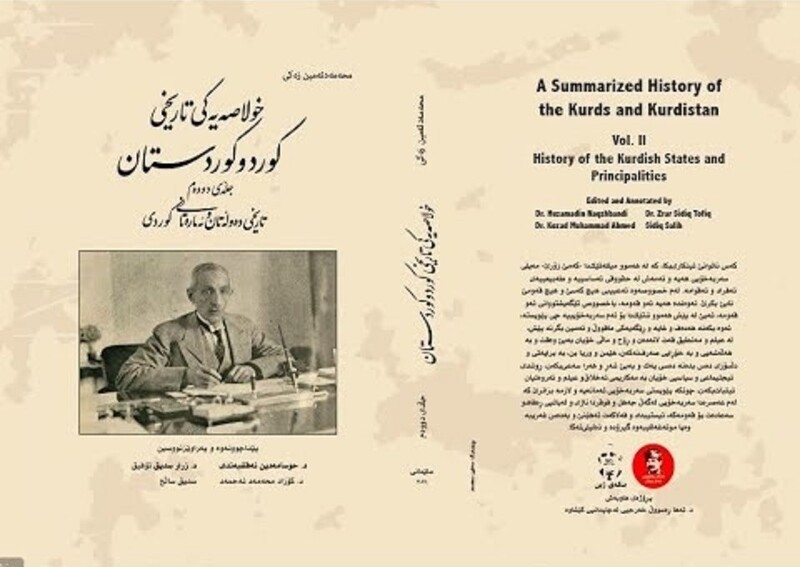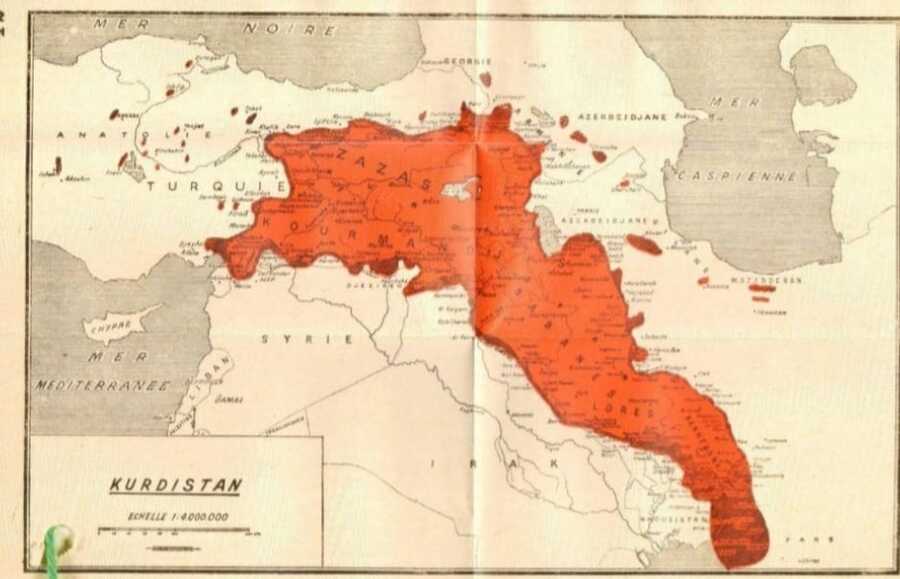Read the two previous parts of this article here
Generally, this work of Mohammad Amin Zaki Bag can be seen as a book that is completely Kurdistan-oriented historically which was previously begun by Huzni in 1925 in Halab city with a book called Spring Blossom; although he continued this work somehow however, Amin Zaki Bag was the author who wrote a history book that was completely Kurdistan-oriented in 1931 and he did so by writing his work called A Summary of the History of Kurds and Kurdistan in the form of a book.
Generally, the book A Summary of the History of Kurds and Kurdistan has several characteristics that are pointed out in the following.
First: avoiding a sense of creating The Other one of the Kurds or enmity with the others. Although Mohammad Amin Zaki Bag was aware of the fact that writing history is a background for creating a nation and the nation needs The Other One, he never admitted to this viewpoint. If we take a glance over the national history books of Persians, Turks, and even Arabs, they are full of creating The Other One and anti-other ones of their nations and identifying those others as their nations' enemies describing them as regressed and illiterate; for instance Mirza Agha Khan Kermani's works in the Persian discourse is full of identifying the Turks and Arabs as the other one of Persians and creating a sense of enmity towards them identifying the Arabs with characteristics such as being regressed and the Turks being so as well and this can be seen in the traditional Turkish and Arabic history discourse. However, Mohammad Amin Zaki Bag did not create such senses as The Other One or enmity with those Others in his book while he did not label the others of Kurds as regressed nations; there are three reasons for this:
a. Mohammad Amin Zaki Bag had relatives in Turkish and Arabic magazines.
b. The Lack of a sense of self-esteem despite announcing the first Mesopotamian state as a Kurdish state in his book.
c. The scientific and humanitarian view of Amin Zaki Bag who believed in coexistence or somehow serving the more powerful state.
"From the past eras up to now, the Kurdish nation has always served or helped their good and just rulers. Any state that has recognized Kurdish people's rights and has supported them have always benefited from Kurds services and their skills and any nations that have tried to be cruel towards the Kurds and ignore their rights and honors have seen Kurds' enmity and resistance" (Amin Zaki, 1397: 192).

Second: as he has mentioned in his book, he has followed the orientalists' viewpoints. Some orientalists such as Minorsky were among the reasons to encourage him to write this book. At that time the only source about the history of Kurdistan before the Islamic era was the orientalists' works and using these sources was common at that time thus, Mohammad Amin Zaki Bag, like many other historians of that time, used the European orientalists' works as his main source to write about pre-Islamic Kurdish history and a source to talk about the origins of Kurds however, he included his own opinions explicitly among the information.
Third: Kurdistan-oriented: as we mentioned earlier recording Kurdistan-oriented history began with the work of Sharaf Kahn Badlisi emphasizing some historical points about Kurdistan such as talking about Kurds' psychology and sociology and later Huzni Mukeryani published "Spring Blossom" in 1925 as the first step in writing Kurdistan-oriented history; however, he did not finish his work. Later, it was Amin Zaki Bag who published "A Summary of Kurds and Kurdistan History" in two volumes in 1931 as the first Kurdistan-oriented history book.
Fourth: abandoning the previous tradition of narrating and beginning to analyze that is, moving from narrating the events to writing history. Amin Zaki Bag did not only think of narrating the events like before, but rather he thinks about the reasons for the events that had happened thus, steps into a new literature in writing history. for example, when he writes about the Safavid he writes: "Shah Abbas's policy towards the Kurds like his previous kings was to make the Kurdish emirates and states collapse and replacing them with Qizlbash rulers and helping them penetrate in the region. These actions were completely contrary to the Ottoman's policy who ruled the Kurds via the famous knowledgeable man, Idris Bitlisi, and their goal was to establish some good principles and the Ottomans made the Kurdish people their friends by establishing some regional governates" (Amin Zaki, 1397: 244). Or when he talks about Kurdish movements, he thinks that these "revolutions that we mentioned such as Jan Polad or Amir Khan Biradosti and … not only were not successful but they were also harmful and caused a lot of damages to Kurdish people's lives. If we think about these revolutions the time they were going on and the reasons for their ends, we can see that the reasons for their defeat were mostly due to foreign interference rather than local weaknesses which were due to our lack of information about our surrounding political conditions" (Amin Zaki, 1397: 190). He also writes about the Kurds and Armenians' issues like this: "Armenians and Kurds did not have any particular problems and these citizens were living together in peace and if the governmental officers would leave them, the Kurds and Armenians would live in peace much longer however since the dominant government considered both of these nations as their Others, they wanted to make them one another's enemies to create struggles and insecurity so that both parties would fear one another and would never have any great movements; this way the government could rule them both easily" (Amin Zaki, 1397: 195).
Fifth: paying a great deal of importance to the history of thinking; perhaps we can say that "A Summary of Kurds and Kurdistan History" was a beginning in giving attention and importance to the history of thinking. In this book, Amin Zaki Bag talks about the establishment of the first Kurdish Council in Istanbul as a part of Kurds' history (Amin Zaki, 1397: 241) and the participation of Kurds in the thinking process and the related events of the Kurdish history were mentioned in Zaki Bag's work for the first time which is worth mentioning.
Finally, we must not forget that some other points must be mentioned but since the article is a preface and cannot be longer, we should give up here. Another point is that this book like many other books has weak points or even mistakes that are collected and clarified by Mr. Zangana; however, in general, "A Summary of Kurds and Kurdistan History" in the Kurdish history writing tradition was a different and scarce work that should be respected and more importantly it should be discussed and analyzed and interpreted however, it is marginalized.








